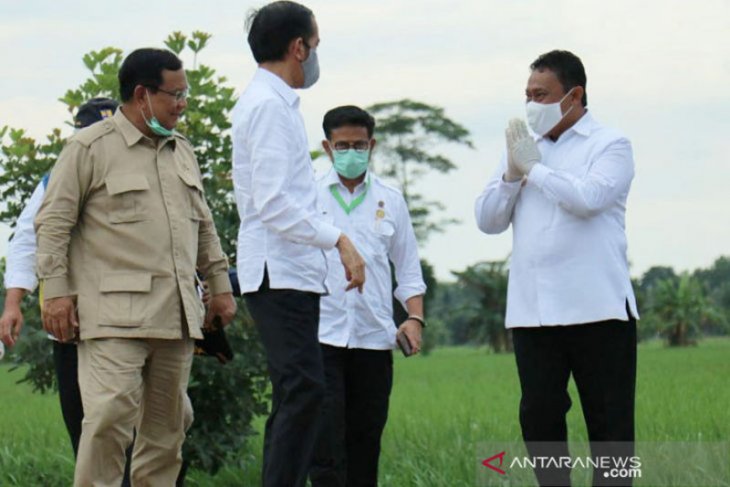Live Streaming
Program Highlight
Company Profile
Farmers' Incomes to Receive Boost from Food-estate Program: Official
Written by Ani Hasanah
President Joko Widodo (third right). ANTARA/HO-Pulang Pisau District Administration
Farmers from Pulang Pisau District in Central Kalimantan Province would be able to capitalize on the Indonesian Government's food-estate program, as it would help boost their incomes, the district's head, Edy Pratowo, stated.
In conversation with local journalists after joining President Joko Widodo's entourage during his official visit to Blanti Siam Village in Pulang Pisau District on Thursday, Pratowo spoke of the government developing its food-estate program in the district's area.
This food-estate program was not solely targeting to preserve Indonesia's food stockpiles but also focused at boosting the country's agricultural production, Pratowo explained.
"The Food and Agriculture Organization (FAO) of the United Nations has warned that the ongoing COVID-19 pandemic may trigger a shortage of food stockpiles," he pointed out.
With food security being the top priority, the government has been working on its food estate program by developing 165 thousand hectares of land into farmland in Pulang Pisau District, Central Kalimantan Province.
The central government is sentient of the importance of boosting the nation's food security amid this ongoing global COVID-19 pandemic and beyond.
During his visit to the village whose area is used for developing new farmland for the food-estate program, President Widodo was accompanied by several cabinet members and top officials, including Defense Minister Prabowo Subianto.
Apart from Subianto, the president's entourage also comprised Minister of Agriculture Syahrul Yasin Limpo, Public Works and Housing Minister Mochamad Basoeki Hadimoeljono, and Presidential Chief of Staff Moeldoko.
According to ANTARA’s observation, despite a steady rise in Indonesia's population, the country had yet to achieve food security, which by definition is related to "food availability, food access, and food utilization" (USAID 1995 in FAO).
Rather than feed its people the rice produced by its own farmers, the central government has frequently imported rice over the past years to meet the public’s requirements.
This condition has, indeed, posed a grave challenge and does not bode well with Indonesia's status as one of the world's top agricultural countries.
Indonesia should not make it a permanent practice to import rice from countries, including Thailand and Vietnam, since it will potentially disadvantage local farmers and threaten its national security in the long term.
On April 21, 2020, President Widodo had called on officials to make a precise assessment of Indonesia's rice stocks.
The president's directive came on the back of the FAO of the United Nations' warning of the COVID-19 pandemic triggering a global food crisis. (ANTARA)
Latest from Ani Hasanah
- Quality Human Resources for Golden Indonesia 2045
- Karisma Event Nusantara 2024 Seeks to Increase Tourism Sector Income
- Two winners of the 2024 National German Language Olympiad to Represent Indonesia at the International Level
- Visa Free Visits as Government's Effort to Create Quality Tourism
- Dutch Ambassador: The Netherlands and Indonesia are Strong Partners



